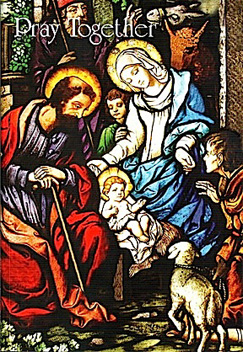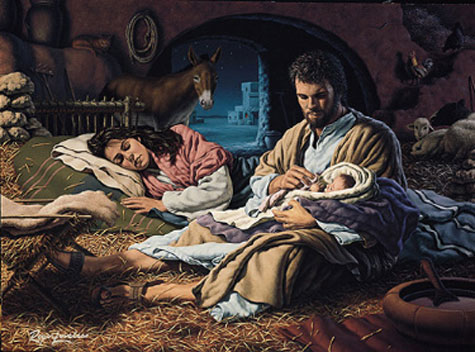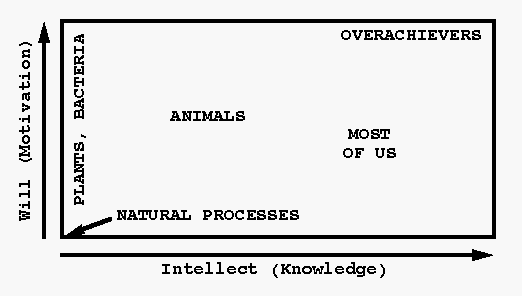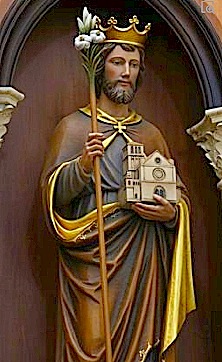Are the Problems of the World God's Fault?
 |  |
| Missalette cover copy of a window in St. John Church, Quincy, Illinois | Painting "In the Hands of the Father" by Roger Loveless |
 |  |
| Missalette cover copy of a window in St. John Church, Quincy, Illinois | Painting "In the Hands of the Father" by Roger Loveless |
Some time ago, as part of his sermon, our pastor passed on a remark made to him by a philosophy student who had an assignment to comment on the proposition to the effect that the problems of the world are due to God having given mankind free will. He seemed to take issue with that.
I wonder why?
As far as I can determine, he did not define what the "problems of the world" being discussed were. As a Catholic minister, one would assume that the words "God" and "mankind" were not in dispute, but "problems" seems to be a judgment call. For example, one of our ministers staunchly maintains that the increase of atmospheric carbon dioxide that is responsible for recent climate change is a natural phenomenon, unrelated to human activity, not a "problem" at all. Given that there have been five "greenhouse" periods between or before known major ice ages on earth, one could indeed consider current global warming to be nothing more than an ongoing event in the natural evolution of our planet. On the other hand, virtually all reputable climatologists agree on the inconvenient truth that the burning of fossil fuels during the Industrial Revolution has liberated and injected into our atmosphere amounts of carbon that it took nature millions of years to sequester in sedimentary rock, coal and petroleum deposits. It is this carbon, in the form of carbon dioxide combustion products, that retains solar heat and causes global warming, disastrous weather changes, and a rise in the mean sea level. So do natural processes such as volcanoes and forest fires, but these have been relatively constant over human history, whereas burning coal and petroleum are recent.
Is global warming a "problem?" The people living in the areas that are going to be under water probably think so. I live where there has been record-breaking hurricane activity lately, and I certainly do. I tend to regard famine, pandemics, wildfires, and widespread poverty to be "problems." If God is the Creator and Sustainer of the universe, that these conditions prevail at all seems to me to be His doing. I submit that the disastrous effects of these conditions are at least partly exacerbated or alleviated by human activity. To the extent that, as our Creator, He has given us the ability to do something about them, pro or con, He is responsible for that, too. I find it difficult (!) to find any reasonable argument that God is not responsible for everything that happens everywhere in the entire universe. I invite anyone who would like to discuss this to email me.
"Fault," however, is something else again. My dictionary defines "fault" as "an unattractive or unsatisfactory feature, especially in a piece of work or in a person's character; a misguided or dangerous action or habit." Since my concept of "God" precludes these pejoratives, I maintain that, while "God" is responsible for everything that exists or happens, nothing is His fault.
I'm not going to get into an argument about "The Problem Of Evil In The World." I think this topic is treated adequately in the discussion beginning in the Catechism of the Catholic Church, paragraph 309. One does not have to be a Catholic to agree (or disagree, for that matter). I have some additional comments here.
To understand what would have happened if God had not given us free will, one need only go back a little more than two million years or so to a time when the most advanced hominids on the planet were gorillas, orangutans, bonobos, chimpanzees and the now extinct species of the genus Homo. There were no home owners, doctors, teachers, lawyers, entertainers, politicians, scientists, inventors, scholars, business executives, priests, or taxpayers. There was no art, agriculture, ranching, industry, science, technology, engineering, seafaring or government, nothing even remotely resembling a philosopher, a preacher, or a church. Culturally, the world was without form and void, and darkness moved across the face of the waters.
Biologically, of course, it was the same as it is today, teeming with the uncountable members of millions and millions (or perhaps billions and billions) of different species of native life! How different from the nearby rocky worlds devoid of life: Venus, Mars, and our own lifeless moon!
We changed all that! Exactly one new species, "sapiens" of the genus Homo, replenished the Earth and subdued it. There is evidence to suggest that the total mass of human artifacts on our planet, including the increased atomospheric carbon dioxide, now exceeds the total mass of all living things! Our planet is now instantly recognizable as the abode of beings who have knowledge and determination, intellect and will, that give us dominion over every other living thing that moves upon the Earth!
Which is not, of course, to say that we haven't caused and endured the consequences of "problems" along the way. We invented plagues that result from pestilence caused by altering the ecosystem and causing famine that follows the devastation of war. War itself is caused by not loving our neighbors as ourselves. Back at the beginning of the Christian era, we managed to have screwed up things so badly that God felt it necessary to become one of us and come down here to tell us personally how to make it right! After almost 2000 years of persistent propagation of this message, though, we still don't listen! We have intellect to tell us what is right and wrong, and free will to do both! They haven't changed since Creation!
The phrase "intellect and will" is mentioned nine times in the Catechism of the Catholic Church. "Free will" appears eight times outside the index; seven times about ours, and once about God's, who "wanted to make His creatures share in His being, wisdom and goodness". Assuming that He got it right, both our intellect and will are good things, like every other product of an infinitely good Creator. They are features of our nature, not bugs.
Our uniquely human intellect and will make our behavior and capabilities fundamentally different from other living things, that, for example, don't study philosophy, preach in church, or use the Internet. Although human activities are not amenable to simple graphic portrayal, one might use the following diagram to discuss how they work.

Plants and bacteria are capable of doing things such as actively avoiding harm and taking refuge in beneficial environments apparently without knowing what they are doing, so one would suspect that they have some kind of motivation, even without intellect. That's basically all I know about how they work.
Animals have motivations to avoid harm and seek things, places or situations that are good for them. They have some sort of knowledge about what they want or need to do; where the food and water are, what to do when danger threatens, how to produce and nurture their offspring, things like that. In this they do not differ markedly from some people. But most of us are capable of figuring out what we do and do not know, how that differs from what we would like to know, how to use that knowledge to get what we want, and what to do about all of that under various circumstances. Intellect gives us information about what our choices are, and will allows us to make them.
Fortunately, the universe operates by a set of unchangeable laws that allow us not only to know what our possible choices are, but also to make reasonably reliable predictions about what the consequences of them are likely to be. We are free to choose what we do, but we are constrained by the laws of nature to endure what happens afterward, regardless of what we intend or would prefer. That can range from being awarded the Medal of Honor like President Teddy Roosevelt and his eldest son, Teddy Junior, or being put to death by lethal injection, like convicted murderer Troy Davis. Freedom of choice only allows one to make choices, not to determine their outcome.
We are, however, fortunate to have among us overachievers who spend their time learning how to make good choices and putting them into practice better than most of the rest of us. They contribute greatly to civilization in the process and, more often than not, influence our individual lives as well. The contributions of great saints come to mind. Not all of us follow their example, though.
Unfortunately, even the greatest intellect does not guarantee us the ability always to make good choices. The Catechism talks a lot about sin, but bad choices are not always sinful. Sometimes, bad choices are due to basic stupidity, which is ultimately a lack of intellectual achievement. If we all had perfect knowledge, we wouldn't be doing stupid things, but we would still be capable of sin because sin is an offense against God. I suspect that being really intelligent would be a factor in our decision(s). Thinking that one is so smart that what he wants is superior to what God has told us to do, on the other hand, invariably ends in disaster!
So at least some of the "problems" of the earth are the result of our having been given free will, but so are all of our achievements, including building churches, artifacts unlikely for any other animal even to recognize, let alone understand. These monuments to our productivity are dedicated to the most human of all activities, the search for spiritual meaning, i.e. more intellectual knowledge. Making a decision to go to church instead of, say, a brothel, seems to me to be a commendable act of will. I find it interesting that mention of God being, or not being, responsible for the "problems" of the world should take place in a church!
Sometimes, though, even with the best of intentions, we approach a decision with activities that are at best, um, "questionable." I submit for discussion the image on the top left of this web page. It is a copy of the front cover of the missalettes, the books of readings and songs, for masses of the liturgical year 2022. The image is a reproduction of a stained glass window in what used to be Saint John the Baptist Catholic Church in Quincy, Illinois.
It is probably intended to represent the event celebrated in the Christian world as the first Christmas. There is Saint Joseph, Baby Jesus, the Blessed Mother, and three other people who may be shepherds or wise men, one of them tethered to a lamb. Conversation with the publisher of the missalette indicates that the church building was purchased by another denomination after consolidation of the Diocese of Springfield. One wonders what the new owners think of the artwork.
There was a time in Christian art when wise people were portrayed as old. Most paintings of St. Joseph I have seen portray him this way. One could assume, then, that the artist intended to indicate that the old guy on the left is exceptionally (!) wise Saint Joseph. Nothing in Scripture suggests that Joseph was, in fact, particularly old or wise, but I'll give him the benefit of the doubt on the latter. This fellow, though, is ancient! Casting someone like him in a Nativity play would be like casting George Burns as Pete "Maverick" Mitchell in Top Gun! It creates a problem of perception of who and what the person represented really is or was.
There is a legend popular in the Eastern Church that Joseph was around 81 when Jesus was born, and died at the age of 111. I'm 81, and I don't look nearly as old as this guy! Would God have picked somebody so elderly to care for and protect His baby son and the mother? Would someone who uses a cane have even been able to manage the 95 mile trip from Nazareth to Bethlehem, let alone the trip all the way to Egypt and back? Why would anyone think that a man that old was the father of Mary's (or any mother's) new baby? Why is Baby Jesus so large - and blond - and so wide awake? What is Mary, who has just given birth, doing up, and what's wrong with her neck? Why does she look like Goldie Hawn? Why create a problem for the viewer?
Another image of St. Joseph that I consider inappropriate, to say no more, is this one:
 |
The flowery staff is an image associated traditionally only with St. Joseph. The statue is dedicated to "St. Joseph the Patron of the Universal Church," which explains the model cathedral he's holding, so we know the statue is of him. I believe it creates a problem of perception, though. I question the propriety of the crown, or the golden robes, however. St. Joseph was the absolute antithesis of a rich, golden-robed and crowned king. He achieved his saintly position by being a common, reliable, humble, dedicated working man, a devoted husband and father, and an individual responsible enough for God Himself to have entrusted His only son into his care. Joseph was a craftsman, so he knew the importance of getting it right if somebody was going to make something!
For this image to be perverted into some kind of rich king seems to me to be a gross insult, as well as a fundamental confusion of status and holiness! It suggests that purposely submitting to God's will, without complaint or question, in spite of hardships, heartaches and virtually insuperable difficulties is not enough; you have to be rich and famous too, or perhaps instead! Joseph wasn't rich or particularly famous, but he dealt with the problems of life by the simple expedient of responsibly solving them! That's how he achieved sainthood!
I think the statue betrays a complete misunderstanding of what the sainthood of Joseph is all about, which is to be whatever God made you to the best of your ability. It is a goal to which every single one of us, without exception, can aspire, whoever or whatever we are. Joseph and his peasant wife Mary are models for everybody
You can see some more popular images of St. Joseph here.
I think the image on the top right is much more realistic. Mary is sleeping after her ordeal on blankets somebody thoughtfully provided for her! Tough-looking (young!) Joseph is playing with (or perhaps gently rocking to sleep) the newborn Baby Jesus, who is warmly wrapped against the night chill. All of them look like Semitic people! There's enough room for everybody, people and animals, not really a bad place for an emergency birth. I don't know if the shepherds have arrived yet or have already left, but Joseph doesn't look like he would tolerate them waking or bothering his young wife, or that anybody with any sense would argue with him about it! The Magi won't show up for a few days, and then it will be to a house! I've known men who could pick up and move to another country, on foot if necessary, at a moment's notice, and Joseph looks like one of them. Baby Jesus and his mom are definitely in good, responsible, hands!
Unfortunately, St. Joseph does not seem to have been given any more respect by historians who have tried to examine his life, or the Evangelists who should have written more about him, than the artists who portray him, which it was the responsibility of all of them to do. As shown in the following table, Matthew and Luke talk about Joseph only seven times, John twice, and Mark doesn't mention him at all! He was obviously well enough known in Nazareth for his neighbors to have known him, as noted in Luke 4:22 and John 1:45 and 6:42, but except for the fact that the people of Nazareth remember him, Joseph disappears from Scripture after he leaves Jerusalem after his young ward "went down with them, and came to Nazareth, and was subject unto them." (Luke 2:51) He is not at the Wedding Feast at Cana (John 2:1-11) or the Crucifixion, otherwise Jesus would have entrusted his mother to her husband, rather than to the young disciple, John. (John 19:26) Joseph of Aramathaea and Nicodemus would never have arranged for Jesus' burial (John 19:38-39) either; that would have been Joseph's responsibility.
It seems to me to be a shame and a scandal for the entire Christian faith that nothing more is known of St. Joseph. It is problem that we don't know what became of him, how he died, or where he might be buried. Had it not been for Joseph's responsible, problem solving ability to overcome evil, Jesus might well have been born to a single mother, or murdered as an infant, yet no one can offer a prayer of thanks at the grave of the dedicated, humble, loving man who saved him from these terrible fates!
| Scriptural References to Saint Joseph | ||||
|---|---|---|---|---|
| Reference | Matthew | Mark | Luke | John |
| Mary, a virgin, was espoused to Joseph, of the House of David | Luke 1;27 | |||
| Genealogy of Jesus | Matthew 1:16 Solomon to Jacob | Luke 3:23 Nathan to Heli | ||
| Joseph Betrothed to Mary | Matthew 1:18 | |||
| Joseph considers divorcing Mary | Matthew 1:19 | |||
| Angel visits Joseph (1st dream) | Matthew 1:20 | |||
| Joseph accepts Mary's pregnancy | Matthew 1:24 | |||
| Joseph and Mary travel to Bethlehem | Luke 2:4 | |||
| Nativity visit of the shepherds | Luke 2:16 | |||
| The Presentation in the Temple | Luke 2:33 | |||
| Angel tells Joseph to flee (2nd dream) | Matthew 2:13 | |||
| Angel tells Joseph to return to Nazareth (3rd dream) | Matthew 2:19 | |||
| Finding Jesus in the Temple | Luke 2:43 | |||
| Jesus identified as the son of Joseph | Luke 4:22 | |||
| Philip Introduces Jesus to Nathaniel | John 1:45 | |||
| Holy Family | John 6:42 | |||
The point of all this is that responsibility is an aspect of holiness. It's how we fulfill our divinely-appointed destiny together to rectify the evils of this world. What may be a "problem" is basically an opportunity virtuously to practice it. I think the "Pray Together" image is crap, but somebody who didn't feel it necessary to consult me thought it was good enough to decorate books we are planning to use for an entire year with it, not to mention an expensive church window. Nobody else I have talked to about it has even seen the Roger Loveless painting. There seems to me to be a rather remarkable lack of responsibility here. Is this a "problem?" I think so! Obviously, others disagree!
I don't think it would be a problem if God hadn't given all concerned free will, including the free will to make decisions about artistic merits, and how to portray the holy Jewish worker responsible for Jesus' upbringing, but then the Loveless painting wouldn't exist, either, Neither, in all probability, would Jesus, Mary and Joseph! They resolved "the problem of evil in the world" by being responsible, of always doing the right thing, no matter how hard, because it was the right thing!
May that be said of us all!